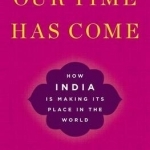Our Time Has Come: How India is Making its Place in the World
BookThis item doesn’t have any media yet
2017 | Business & Finance
In the last 25 years, India-soon to be the most populous nation in the world-has experienced explosive economic growth that has vaulted it into the ranks of the world's emerging major powers. Long plagued by endemic poverty, until the 1990s the Indian economy was also hamstrung by a burdensome regulatory regime that limited its openness and competitiveness in an increasingly globalized world. Since then, however, the Indian government gradually opened up the economy, moving away from a quasi-socialist import substitution model. The results have been stunning: the middle class has grown by leaps and bounds, Fortune 500 CEOs visit regularly, and the country now occupies an increasingly prominent place on the global stage. From world trade to climate change to democratization, India's position now matters. Yet India has not entirely abandoned its past policies. It remains protectionist in comparison to many other emerging economies and has not fully abandoned its adherence to the foreign policy doctrine of non-alignment. Most experts agree that India is on its way to becoming a great power, but what kind of great power it wants to be remains a mystery.
In Cautious Superpower, the India specialist Alyssa Ayres looks at how the tension between India's closed and inward looking past and its ongoing integration into the global economy will shape its trajectory in the foreseeable future. The sheer scale of India-its huge population and $2 trillion economy-means its decisions will have a major global impact. These decisions, though, are not easy to predict. Unlike China, India is a vibrant democracy whose vast array of parties champion dizzyingly disparate policies. Nor is India easily susceptible to foreign influence. As a proud and increasingly assertive nation, it guards against perceptions that it is succumbing to international pressure-especially from the United States. For all of these reasons, India tends to move cautiously and deliberately in the international sphere, always prioritizing its autonomy and independence (behavior that can be attributed, in part, to its long history as a colony of Britain).
In Cautious Superpower, Ayres considers the role India is likely to play in global affairs as its prominence grows, taking stock of the risks and opportunities for the US and other nations as the world's largest democracy defines its place in the world. Given that it breaks the mold of the typical "ally" and will instead emerge as a unique power all its own, there is much to consider as America and the world attempt to make sense of India's rise.
Related Items:
| Published by | Oxford University Press Inc |
| Edition | Unknown |
| ISBN | 9780190494520 |
| Language | N/A |
Images And Data Courtesy Of: Oxford University Press Inc.
This content (including text, images, videos and other media) is published and used in accordance
with Fair Use.
